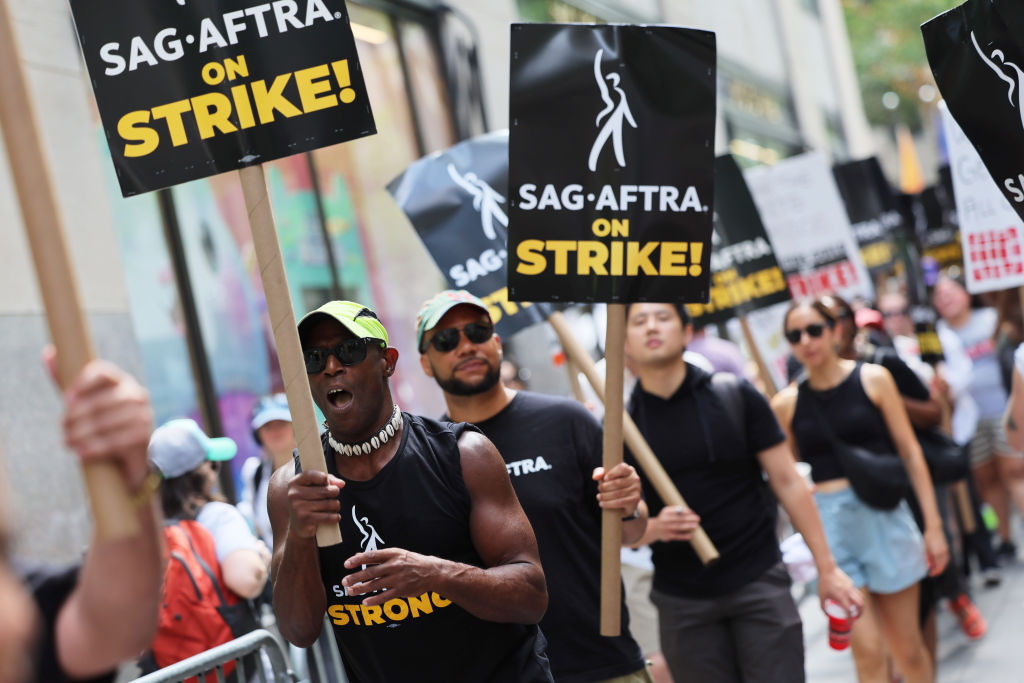Striking actors shut down Hollywood
Technology is changing the economics of the entertainment industry

A free daily email with the biggest news stories of the day – and the best features from TheWeek.com
You are now subscribed
Your newsletter sign-up was successful
The smartest insight and analysis, from all perspectives, rounded up from around the web:
Hollywood studios thought they could "ride out the skirmish with screenwriters" and keep the entertainment factory going, said Meg James in the Los Angeles Times. Now, with Hollywood actors joining striking screenwriters last week for the biggest Tinseltown shutdown in more than six decades, things aren't turning out that way. "Movie shoots have ground to a halt," with big-budget sequels like "Gladiator 2" and "Deadpool 3" shutting down in the middle of shooting. "A-list stars have bailed on film and TV marketing campaigns," including the premiere of the upcoming "Oppenheimer." And as of this week, there's no hint of progress in negotiations. The 160,000-member actors' union, SAG-AFTRA, has argued that streaming has enabled studios to unfairly cut their pay. They also want "protections against the use of AI to simulate background actors," potentially replacing extras on future sets. The simultaneous strikes "couldn't come at a worse time for entertainment companies," who are still trying to grapple with the economics of streaming, lower box-office figures, and the demise of traditional broadcast and cable.
The "us against them," haves vs. have-nots mood in Hollywood is "straight out of Les Miz," said Brooks Barnes in The New York Times. Striking actors have pointed to the pay packages of studio heads — Warner Bros. Discovery's David Zaslav got an astonishing $246 million in 2021. But beneath the surface the studios were already facing existential questions. The domestic box office is still down 21 percent from 2019. The cable television model, which studios like Disney and Paramount "have relied on for decades for fat profit growth," is "over." Then, last year, Netflix reported a subscriber loss, "and Wall Street's interest swiveled" from the arms race for subscribers to a desire for profits. Unwieldy streaming services suddenly "slashed billions of dollars in costs and eliminated more than 10,000 jobs." Now the unions are pushing back.
The Week
Escape your echo chamber. Get the facts behind the news, plus analysis from multiple perspectives.

Sign up for The Week's Free Newsletters
From our morning news briefing to a weekly Good News Newsletter, get the best of The Week delivered directly to your inbox.
From our morning news briefing to a weekly Good News Newsletter, get the best of The Week delivered directly to your inbox.
"There will be no fresh helpings of 'The White Lotus,' 'The Last of Us,' or even 'Emily in Paris' beaming into front rooms when summer fades," said Vanessa Thorpe in The Guardian. Americans, and much of the world with them, had gotten used to an endless stream of high-quality entertainment. But now they are coming face to face with the uncomfortable fact that even as entertainment choices have exploded, creators haven't shared in the bounty. In television, actors "have traditionally had a base of income" from reruns and other forms of reuse, said Michael Schulman in The New Yorker. But "streaming has scrambled that model," and "endangered the ability of working actors to make a living."
You might be tempted to dismiss striking actors as "privileged elites whining about a dream job," said James Poniewozik in The New York Times. Don't, because beyond a few superstars, the great majority of actors are in much the same spot as the rest of us. "In the grand scheme, most of us are background players," facing down the same modern risk: that "every time a technological or cultural shift happens, companies will rewrite the terms of employment to their advantage."
This article was first published in the latest issue of The Week magazine. If you want to read more like it, you can try six risk-free issues of the magazine here.
A free daily email with the biggest news stories of the day – and the best features from TheWeek.com
-
 The week’s best photos
The week’s best photosIn Pictures An explosive meal, a carnival of joy, and more
-
 The ‘ravenous’ demand for Cornish minerals
The ‘ravenous’ demand for Cornish mineralsUnder the Radar Growing need for critical minerals to power tech has intensified ‘appetite’ for lithium, which could be a ‘huge boon’ for local economy
-
 Why are election experts taking Trump’s midterm threats seriously?
Why are election experts taking Trump’s midterm threats seriously?IN THE SPOTLIGHT As the president muses about polling place deployments and a centralized electoral system aimed at one-party control, lawmakers are taking this administration at its word